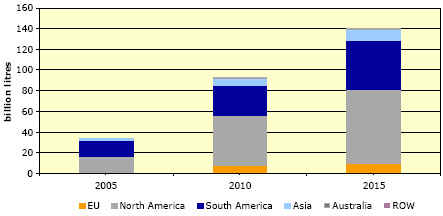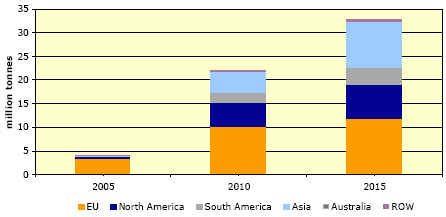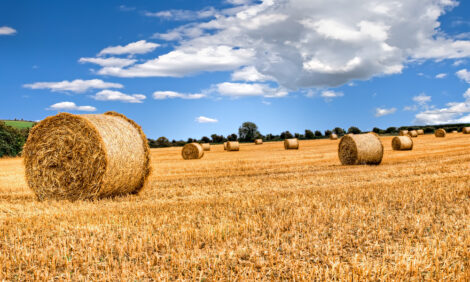



Impact of Biofuels on Meat Production
The biofuels industry is a policy driven industry that is influenced by the need to reduce the use of energy resources, agricultural support and environmental issues, writes Chris Harris Senior Editor, TheCattleSite.Speaking during the International Meat Secretariat's beef committee meeting at the World Meat Congress, to Vito Martielli from Rabobank said that the USA and Brazil are set to remain the main ethanol producing nations up to 2015, when production will reach 141 billion litres.
Global biodiesel production is set to reach 33 million tonnes by 2015 with the EU being the main producer.

Chart: Rabobank

Chart: Rabobank
However, he said that global meat demand is also expected to grow over the next decade and this will produce a growth in the need for livestock feed and the global demand for commodities is expected to grow by 180 million tonnes by 2015.
He said that production systems are going to be affected by high grain and commodity prices and this will produce a disparity between production costs for silage and grass fed beef and grain fed beef. With higher grain prices, beef cattle as a by product of the dairy industry and also grass fed beef production systems will benefit.
While grain fed beef production systems will be affected by the rise in grain prices, these feedlot systems can also use by products from the biofuel industry, dried distiller's grains with solubles - DDGS as well as animal fats and rapeseed meal.
However, the amount of by-products that can be used from the biofuel industry will be limited according to the sophistication of that industry in each country.
Mr Martielli said that Brazil would be one major beef producing country able to use these products and France will be able to see a benefit from the DDGS because of the sophistication of the industry in the country.

Bradley Wheaton, director of the National Biofuels Group in Australia, speaking during the World Meat Congress in Cape Town reaffirmed the importance of the environment, fuel security and rising oil prices as major drivers in the production of biofuels and the use of crops for biodiesel production.
He said that the biofuels industry had produced large benefits for farmers, who were growing the feedstock for the industry and he added that in countries such as the US the support mechanisms for those growing crops for the biofuels industry were considerable.
"There has been strong support by governments around the world for the biofuels industry," he said.
Mr Wheaton added that it is only recently that there has been a large shift in investment into the industry - a shift that had not been noticeable in the earlier years between 2006-2008.
He said that now feedstocks that are being devoted to the biodiesel industry - such as soybean and canola - have less of an effect on the food security and animal feed than the use of corn for ethanol.
But he added that such has been the rate of growth in the biodiesel industry that there has been vast overcapacity produced and it is only as the industry develops that production facilities will be taken off line. The way forward will be the growth of large-scale production plants.
He indicated that ethanol production from sugar cane in Brazil and sugar beet in the EU was helping to reduce pressure on animal feed stocks. However, in the US ethanol is made from corn, he said, and "this produces increasing demand for coarse grain and low grade grains".
Mr Wheaton also stressed the importance of DDGS (both wet and dry with solubles) as a by-product of the biofuel industry.
"Of all the by-products, these have a valuable use in the livestock industry," he said.
"And for the different livestock industries there are different uses for different by-products."
However, he said there has been a conflict between the North American ethanol industry and the beef and dairy industries.
He said that the subsidisation of ethanol production has had an impact on prices of the fuel and corn and this has had a knock on effect on land values and on the prices of DDGS.
He said he believed that corn use in ethanol production will fall and prices of corn will fall if energy prices fall.
He added that the ethanol and biofuels industry needs a breakthrough in technology to use other feedstocks, but this will require a change in government policy.
He said that the DDGS makes a high quality livestock feed which is used most in the beef, dairy and pig meat industries, while soybean is used by the poultry industry and canola meal by the pork and poultry industries.
The demand for corn from China is also likely to have a greater impact on the corn and grain industry than the biofuel industry because of a rapid increase in meat consumption in the country.
In future the effect that use of grains and feedstocks for the biofuel industry has on the meat industry will depend on which biofuel is produced and which feedstock is being used, Mr Wheaton concluded.
Mr Martielli earlier showed that the volatility of the beef industry through all its phases - breeding, farming, feed and slaughtering - could cause pricing problems and these higher prices will have to be passed on through the industry to the consumer, he said.
He warned of a higher volatility in the soft commodities market generally, but he said that biofuels would not be the most important driver as feed costs will be playing a great part.
"All players in the industry will need to mitigate the risk, although the biofuels industry can offer some opportunities to the beef industry," he said.


